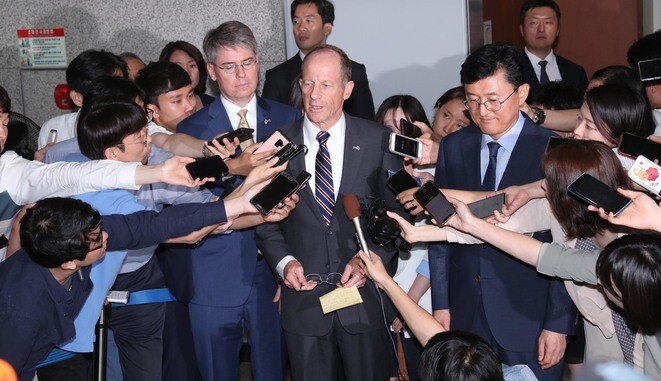hankyoreh
Links to other country sites 다른 나라 사이트 링크
[Editorial] The importance of Stilwell’s remarks for supporting diplomatic efforts

During a trip to South Korea on July 17, a senior official in the US State Department said that the US, as a “close friend and ally” to both South Korea and Japan, would “do what we can to support their efforts to resolve” their ongoing dispute.
“Fundamentally [the] ROK [South Korea] and Japan must resolve the sensitive matters, and we hope that the resolution happens soon,” said David Stilwell, the US assistant secretary of state for the Bureau of East Asian and Pacific Affairs, calling on both sides to take proactive steps.
These remarks suggest that the US will take steps to prevent the dispute between its two allies, South Korea and Japan, from worsening, potentially damaging US security interests in Northeast Asia and sowing chaos throughout the global semiconductor supply chain.
Stilwell’s remarks are notable since they diverge in tone from the recent attempt by the US government to distance itself from the dispute between South Korea and Japan. A few days ago, US Ambassador to South Korea Harry Harris said that this isn’t the time for the US to mediate or intervene in South Korea-Japan relations, and Stilwell himself said last week that the US wouldn’t intervene in the two countries’ disagreement.
But now the US has called for South Korea and Japan to find a quick solution and has promised to support their diplomatic efforts. While the US didn’t specify exactly what it will do and is unlikely to do anything substantial, the very fact that it’s urging the two countries to make efforts to resolve their issues diplomatically appears to be of no small significance.
But regardless of whether the US intervenes, the fact remains that the key to solving this issue is held by the parties in the dispute, namely South Korea and Japan. No one can step in to fix things on their behalf. We urge the two countries’ governments to immediately engage in diplomatic deliberations without any conditions in order to prevent this from escalating into a more serious trade dispute.
Japan is calling for the establishment of an “arbitration committee,” as provided for in the two countries’ 1965 claims agreement, but the current conflict isn’t simple enough to be resolved through such a committee. Rather than insisting on an arbitration committee, Japan needs to be more open-minded and engage in various kinds of diplomatic negotiations capable of covering the whole range of issues.
The South Korean government also needs to be more flexible about other plans than its “one plus one plan,” in which the victims of forced labor are paid reparations using funds provided by companies from both sides. If Japan goes ahead with further punitive steps and South Korea responds in kind, their bilateral relations could truly reach the point of no return. The two sides should follow Stilwell’s advice and engage in negotiations before it’s too late.
Please direct comments or questions to [english@hani.co.kr]

Editorial・opinion
![[Column] Season 2 of special prosecutor probe may be coming to Korea soon [Column] Season 2 of special prosecutor probe may be coming to Korea soon](https://flexible.img.hani.co.kr/flexible/normal/500/300/imgdb/original/2024/0426/3317141030699447.jpg) [Column] Season 2 of special prosecutor probe may be coming to Korea soon
[Column] Season 2 of special prosecutor probe may be coming to Korea soon![[Column] Park Geun-hye déjà vu in Yoon Suk-yeol [Column] Park Geun-hye déjà vu in Yoon Suk-yeol](https://flexible.img.hani.co.kr/flexible/normal/500/300/imgdb/original/2024/0424/651713945113788.jpg) [Column] Park Geun-hye déjà vu in Yoon Suk-yeol
[Column] Park Geun-hye déjà vu in Yoon Suk-yeol- [Editorial] New weight of N. Korea’s nuclear threats makes dialogue all the more urgent
- [Guest essay] The real reason Korea’s new right wants to dub Rhee a founding father
- [Column] ‘Choson’: Is it time we start referring to N. Korea in its own terms?
- [Editorial] Japan’s rewriting of history with Korea has gone too far
- [Column] The president’s questionable capacity for dialogue
- [Column] Are chaebol firms just pizza pies for families to divvy up as they please?
- [Column] Has Korea, too, crossed the Rubicon on China?
- [Correspondent’s column] In Japan’s alliance with US, echoes of its past alliances with UK
Most viewed articles
- 1‘We must say no’: Seoul defense chief on Korean, USFK involvement in hypothetical Taiwan crisis
- 2[Column] Season 2 of special prosecutor probe may be coming to Korea soon
- 3N. Korean delegation’s trip to Iran shows how Pyongyang is leveraging ties with Moscow
- 4Amnesty notes ‘erosion’ of freedom of expression in Korea in annual human rights report
- 5[Reportage] On US campuses, student risk arrest as they call for divestment from Israel
- 6Korea sees more deaths than births for 52nd consecutive month in February
- 7[Editorial] New weight of N. Korea’s nuclear threats makes dialogue all the more urgent
- 8‘Weddingflation’ breaks the bank for Korean couples-to-be
- 9[Column] Has Korea, too, crossed the Rubicon on China?
- 10[Column] Park Geun-hye déjà vu in Yoon Suk-yeol